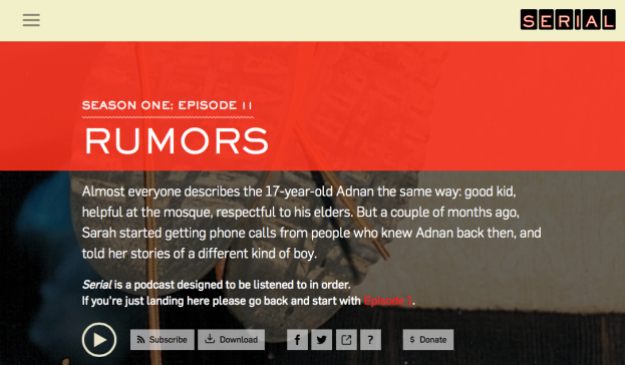The highly acclaimed podcast “Serial” concludes this Thursday. To mark the occasion, longtime journalist Brian C. Jones wrote a guest commentary on Tuesday regarding what he believes are the series’ journalistic and ethical shortcomings. Today I offer my response. — Dan
Sarah Koenig has often been quoted as saying that she doesn’t know how her podcast “Serial” will turn out. And those of us who have listened to every episode understand she still harbors suspicions that her protagonist, Adnan Syed, actually did murder his ex-girlfriend when they were Maryland high school students 15 years ago.
Brian C. Jones makes much of this in his commentary, writing that “Serial” is more voyeurism than journalism. “Without an answer,” he says, “it’s a little like digging up a coffin just to see what’s inside.” Jones offers some strong arguments about ethics and a journalist’s responsibility, but I disagree with his assessment. “Serial” may not be traditional journalism, but it is journalism, and of a rather high order.
Instead of a five-minute piece (a lifetime on radio, even on public radio) looking into a murder case about which questions remain, we’ve been brought inside the journalistic sausage-making factory. Koenig doesn’t know whether Syed killed Hae Min Lee, and we are with her every step as she gropes for answers. We are participants with Koenig; her emotions are ours. Yes, that’s a long way from a wire-service story that begins with the words “Police said.” But does that kind of journalism work anymore? Did it ever?
More important, it’s easy to make too much of Koenig’s uncertainty, as I think Jones has. In fact, she did a lot of reporting — perhaps the bulk of her reporting — before the first episode was uploaded. She’d been at it for a year, and had done several segments for “This American Life” (I confess I have not heard those early pre-“Serial” stories) before the saga of Adnan Syed was spun off.
From the beginning of “Serial,” it was clear that Koenig seriously doubted Syed’s guilt, even though she didn’t entirely rule it out. Moreover, her reporting revealed there was little or no physical evidence linking the murder to Syed, and that the prosecution’s main witness, Jay, who was Syed’s alleged accomplice, had told wildly inconsistent stories to investigators. As the series has unfolded, we’ve also learned that the timeline prosecutors laid out was close to an impossibility, and that Syed’s lawyer, who was probably seriously ill during Syed’s two trials, made crucial errors. Anti-Muslim animus may have entered into the proceedings as well.
That’s more than enough not just to launch a serious journalistic inquiry but to publish the results. A better way of thinking about the dilemma Jones defines might be to say that Koenig did not know how “Serial” would turn out once her reporting hit the Internet. Of course, she had no way of knowing that her work would become a phenomenon; but surely she understood that people who cared about the case would hear it. Having established doubt — maybe even reasonable doubt — about Syed’s guilt, perhaps her series would result in more evidence coming out. Maybe someone would even identify the real killer, assuming it is not Syed.
On a recent episode Koenig addressed news reports such as this one that Syed had been granted an appeal. It wasn’t so simple, she explained. Syed is at the very beginning of a long road, and he may not get very far. Once someone has been convicted, it is extremely difficult to get that conviction overturned unless there is compelling evidence of innocence. (And even then.) Given the realities of the justice system, the chances of Thursday’s final episode being a blockbuster seem unlikely.
Still, Koenig’s meticulous reporting has raised sufficient doubts about Adnan Syed’s guilt that he may get another chance. Isn’t that what good journalism is supposed to do?

![1-Brian%20C.%20Jones%202014.1[3]](https://dankennedy.files.wordpress.com/2014/12/1-brian20c-20jones202014-13-e1418743034661.jpg?resize=100%2C147&quality=89)